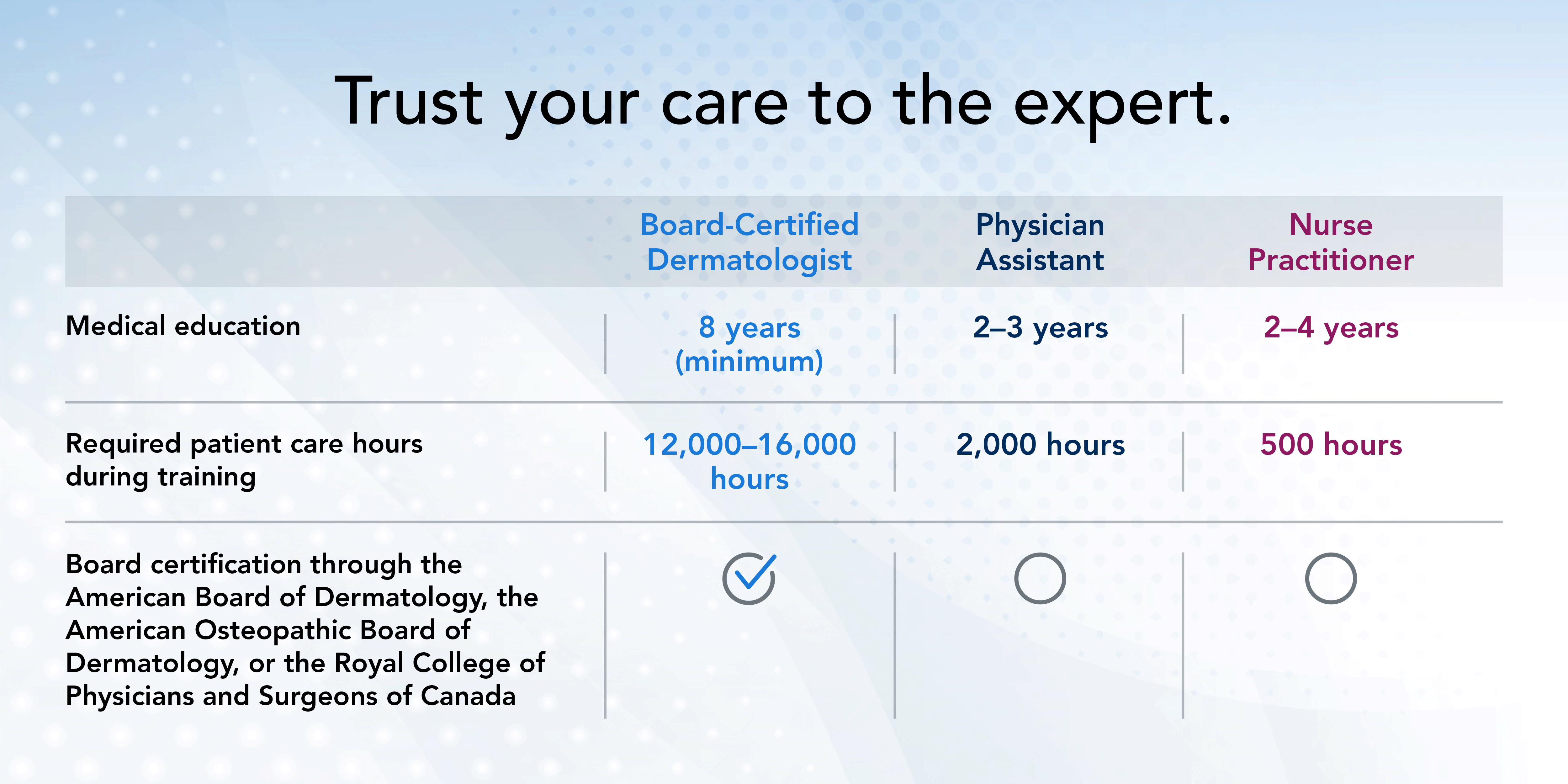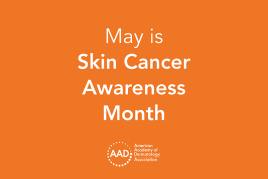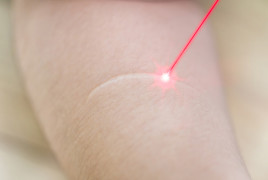Why choose a board-certified dermatologist?
A board-certified dermatologist is a doctor who has:
Completed medical school and then three to four years of advanced medical training in treating diseases of the skin, hair, and nails
Passed rigorous exams in dermatology
Made a commitment to keep up on the latest advances in dermatology
When you see the letters FAAD by a dermatologist’s name, you know you’re seeing a doctor who:
Is board certified
Has the most rigorous medical education and training in dermatology
Keeps up with medical advancements
Is a member of the American Academy of Dermatology
What conditions do dermatologists treat?
Dermatologists treat more than 3,000 conditions that affect the skin, hair, and nails. Skin diseases are especially common, affecting one in four Americans each year.
Choose a dermatologist
Dermatologists are medical doctors who diagnose and treat over 3,000 skin, hair, and nail diseases and conditions. Trust your care to the experts.
On any given day, a dermatologist may treat patients with melanoma (a type of skin cancer that can turn deadly), warts, and eczema or another long-term disease. That same day, a dermatologist may also see a patient who has a condition caused by problems with the immune system like psoriasis, an allergic skin reaction like allergic contact dermatitis, and an infection that can be life-threatening like cellulitis.
Dermatologists also treat patients who want help with cosmetic concerns. This includes giving patients with aging skin a more youthful appearance, removing unwanted fat or hair, and diminishing scars due to acne or other causes.
People trust their cosmetic concerns to board-certified dermatologists because these doctors have advanced knowledge of cosmetic treatments. They also know the skin and the anatomy of the nerves and muscles that lie beneath the skin. This expertise helps them choose the best cosmetic approach for each patient, which helps to avoid issues with cosmetic treatments and correct an issue quickly if it happens.
Another benefit of seeing a board-certified dermatologist for your cosmetic concern is to make sure your concern is cosmetic. For example, a pimple that won’t go away could be a skin cancer. Dermatologists can spot problems like this, which you may not know you have.

When you see a board-certified dermatologist, other medical staff who work in a dermatology office may be involved in your care. This can include care team members like a physician assistant or nurse practitioner.
The American Academy of Dermatology recognizes the important roles that all medical staff in a dermatology office have in caring for patients. The AAD supports this care when it’s under the direction of a board-certified dermatologist.
Is skin disease serious?
Many skin diseases involve serious health risks. Even if the condition is not life-threatening, it may reduce a person’s quality of life causing loss of sleep, poor self-image, serious depression, and lost productivity.
Dermatologists understand that skin conditions are more than skin deep
What seems like a simple rash might be a sign of underlying disease.

Dermatologists understand the interaction between the skin and the rest of the body. What seems like a simple rash might be a sign of underlying disease. For example, an itchy rash could be hives, scabies, or a skin reaction called contact dermatitis. Each of these diseases requires different treatment.
Dermatologists also know what other medical conditions to look for when a patient has a skin condition like psoriasis, eczema, or rosacea. For example, people living with psoriasis have a higher risk of developing high blood pressure, unhealthy cholesterol, and diabetes. Making healthy choices now may help prevent these related issues from developing.
Who should see a dermatologist?
Dermatologists treat patients of all ages, from newborns to people who are more than 100 years old.
Dermatologists treat patients of all ages
Dermatologists treat patients of all ages, from newborns to people who are more than 100 years old.

Anyone who has concerns about a condition involving the skin, hair, or nails should see a board-certified dermatologist. A board-certified dermatologist has many years of advanced training in correctly identifying conditions that affect the hair, skin, and nails. Getting an accurate diagnosis is the key to receiving proper treatment.
If you want excellent care, choose a board-certified dermatologist.
Related AAD resources
Images
Images 1,2: Property of the American Academy of Dermatology
Images 3,4: Getty Images
Last updated: 8/23/21
 Think sun protection during Skin Cancer Awareness Month
Think sun protection during Skin Cancer Awareness Month
 How to care for your skin if you have lupus
How to care for your skin if you have lupus
 Practice Safe Sun
Practice Safe Sun
 Sunscreen FAQs
Sunscreen FAQs
 Fade dark spots
Fade dark spots
 Hidradenitis suppurativa
Hidradenitis suppurativa
 Laser hair removal
Laser hair removal
 Scar treatment
Scar treatment
 Botox
Botox
 Kids' camp - Camp Discovery
Kids' camp - Camp Discovery
 Dermatologist-approved lesson plans, activities you can use
Dermatologist-approved lesson plans, activities you can use
 Find a Dermatologist
Find a Dermatologist
 Why choose a board-certified dermatologist?
Why choose a board-certified dermatologist?